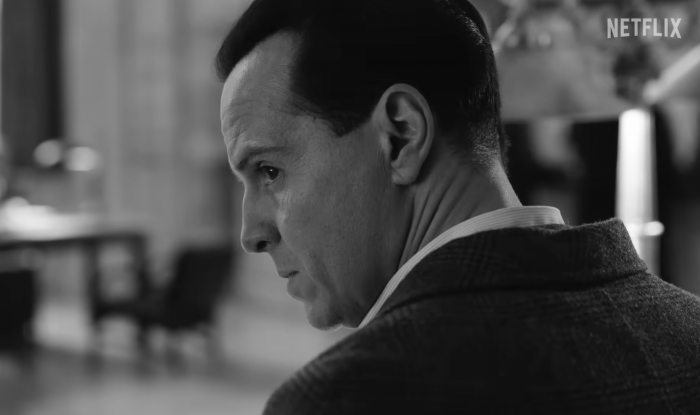

The Thrill of the Grift: ‘Ripley’ Makes the Devil Relatable
By Kaleena Rivera | TV | April 15, 2024 |
By Kaleena Rivera | TV | April 15, 2024 |

(spoilers for Ripley)
If I had to pick one piece of advice to give someone who’s on the fence when it comes to watching Ripley, it would be to savor it. Savor it the way that Tom Ripley (Andrew Scott) relishes the Caravaggio paintings displayed among each of the glorious Italian locales he absconds to so he can maintain his freedom and the identity he’s snatched away. Over eight roughly hour-long episodes (the delicious finale clocking in at a hefty 76 minutes), we see Tom spin endless explanations and dance around the many inconsistencies nimbly enough to cast just enough doubt on his guilt to allow the eyes of the police, and others, to look away long enough for him to shimmy out from underneath them and start the process all over again. He’s a con artist, an unrepentant murderer, and wildly overestimates his intelligence, yet I want nothing more than to see him win.
That’s the beauty and power of a character who commits objectively terrible acts with panache: their fictional status gives free license to cheer on their progression in the story. I winced when Tom delivered the killing blow to poor Richard “Dickie” Greenleaf (Johnny Flynn), both for its cold cruelty and Dickie’s utter defenselessness, a man whose biggest crime was being a terrible painter (and a bad judge of character). But my resulting feelings were never in the vein of “I would like to see that man punished for this heinous crime,” but rather, “oh no, the cat killed another mouse, such a brute,” only to allow said cat to rest at the foot of my bed later that evening.
I felt substantially less compassion for Freddie Miles’ (Eliot Sumner) violent end, not because he deserved it—I confess his smugness contributes to the lack of sorrow—but because when it comes to vying for the average audience member’s affection for imaginary characters, a mentally unwell murderer who makes me laugh is going to win out over a snobby rich kid, especially one who’s threatening to put a stop to the good time being had on screen. “Funny” probably isn’t the first, or even the tenth, word to come mind when describing Ripley, but I found myself laughing far more often than I ever would have imagined, whether it was Tom forcing himself to repeatedly confront the punishing number of Italian stairs, the disastrous dumping of Dickie’s body, or the obvious internal debate over whether or not he should kill Marge (Dakota Fanning) for little reason other than the fact that she makes for an annoying roommate.
Admittedly, much of the fascination towards a covetous snake-like Tom Ripley can be laid squarely at Scott’s feet. It’s a pitch-perfect performance, elevated even further by the careful balance he maintains between being an awkward creep and a master manipulator. I’ve heard people liken Tom to an alien, like a creature infiltrating our species, whereas I find Tom to be remarkably human, a refined version of the toddler impulse to take what’s appealing or deemed necessary. Swindling people out of their money is a necessity (arguably), but taking Dickie’s life, in every way that matters, is too appealing to resist.
But if Tom’s horrific actions hook us, his ever-shifting plans afterward keep us on the line. What makes it all the more intriguing is that, although clever, Tom is more fallible than the perpetrator of multiple homicides has any right to be. What’s truly amusing (yet sadly holds true for many real life criminals) is that Tom’s success relies heavily on luck. Some instances are simply a failure when it comes to powers of observation (hotel clerks who neglect to take notice of the mismatching passport photo) while others are a hasty assumption (Marge becoming convinced that Dickie chose to kill himself). Tom’s fortune does strain belief at times—most notably when donning a beard and wig is enough to fool the otherwise sharp investigating detective (Maurizio Lombardi as the often hilarious Inspector Ravini) into believing he’s speaking to someone he’s never met before—but it keeps the suspense humming along nicely.
However, Tom is just competent enough that most of his victories feel earned. It’s the sort of cat and mouse game that I feared would come to an end all-too-soon, lest I’m no longer regaled by the misadventures of this odd but, deep down, slightly relatable man; who among us, after all, has never imagined ourselves possessing something that belongs to someone else? Maybe that’s where the appeal of this breed of villain ultimately lies. As valuable as the one-two combo of writing and performance are, what makes it work beneath it all is the fact that we’re being invited to ask ourselves what we’re capable of in the pursuit of our desires. Maybe it’s less about having sympathy for the devil and more to do with sympathizing with ourselves. Of course, it could simply be that watching people behave badly makes for a hell of a good time.
All eight episodes of Ripley are available to stream on Netflix.
Kaleena Rivera is the TV Editor for Pajiba. She can be found on Bluesky here and Twitter.
← Why Does Edwin Stanton Burn the Pages of John Wilkes Booth's Diary in 'Manhunt'? | Review: 'Scoop' Dives Into the Infamous Prince Andrew Interview →
More Like This
Why Does Edwin Stanton Burn the Pages of John Wilkes Booth's Diary in 'Manhunt'?
'Davey & Jonesie's Locker' Tackles The Difficulties Of High School Through The Multiverse
Megan Fox Breaks Her Silence on Chelsea Blackwell’s ‘Love Is Blind’ Resemblance Comment Controversy
No, 'Doctor Who' Is Not Replacing Millie Gibson as a Companion After One Season
Reese Witherspoon Wonders if Careers Like Hers and Jennifer Aniston’s Are ‘Possible Ever Again’

Megan Fox Breaks Her Silence on Chelsea Blackwell’s ‘Love Is Blind’ Resemblance Comment Controversy
Drew Carey Doesn't Think He Should Get Credit For 'Doing The Right Thing'
Reese Witherspoon Wonders if Careers Like Hers and Jennifer Aniston’s Are ‘Possible Ever Again’
'Deadpool & Wolverine' Director Says New Film Is A 'Different Thing'
James Gunn Is Already Filming ‘Peacemaker’ Season 2
We’re Getting a Chris Farley Biopic Directed by… Josh Gad?
More Like This
Why Does Edwin Stanton Burn the Pages of John Wilkes Booth's Diary in 'Manhunt'?
'Davey & Jonesie's Locker' Tackles The Difficulties Of High School Through The Multiverse
Megan Fox Breaks Her Silence on Chelsea Blackwell’s ‘Love Is Blind’ Resemblance Comment Controversy
No, 'Doctor Who' Is Not Replacing Millie Gibson as a Companion After One Season
Reese Witherspoon Wonders if Careers Like Hers and Jennifer Aniston’s Are ‘Possible Ever Again’
Reviews